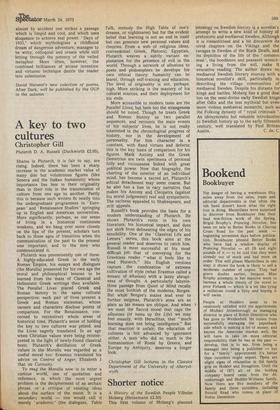A key to two cultures
Christopher Gill
Plutarch D. A. Russell (Duckworth £2.95).
Shares in Plutarch, it is fair to say, are rising. Indeed, there has been a sharp increase in the academic market value of many dim but voluminous figures (like Seneca and the Itabian humanists) whose importance lies less in their originality than in their role in the transmission of culture from one age to another. Partly this is because such writers fit neatly into the undergraduate programmes in ' European ' and 'Renaissance Studies' springing up in English and American universities. More significantly, perhaps, as our sense of living in a historical continuum weakens, and we hang ever more closely on the lips of the present, scholars turn back to those ages of transition when the communication of the past to the present was important; and to the men who communicated it.
Plutarch was preeminently one of these. A highly-educated Greek in the early Roman Empire, his essays and dialogues (the Mora/ia) presented for his own age the moral and philosophical lessons to be learned from the mass of Classical and Hellenistic Greek writings then available. The Parallel Lives placed Greek and Roman history in the same cultural perspective: each pair of 'lives present a Greek and Roman statesman, whose careers and characters disclose points of comparison. For the Renaissance, concerned to reconstruct whole areas of historical time, Plutarch's sense of holding the key to two cultures was prized, and the Lives eagerly translated. In an age when Christian values were being reinterpreted in the 'light of newly-found classical texts, Plutarch's distillation of Greek values in the Mora/ia was regarded as a useful moral too: Erasmus translated his advice on Control of Anger, Elizabeth I that on Curiosity.
To read the Moralla now is to enter a curious world, one of quotation and reference, in which the most urgent problem is the decipherment of an archaic phrase, or a critique of existing ideas about the surface of the moon. It is a secondary world — one would call it merely ' academic ' (the dialogues, Table Talk, embody the High Table of one's dreams, or nightmares) but for the evident belief that learning is not an end in itself but can generate new personal values and theories. From a web of religious ideas, conventional Greek, Platonic, Egyptian, Plutarch weaves a subtly variant explanation for the presence of evil in the world. Through a network of allusions to poets and philosophers he develops his own ethical theory: humanity can be learnt, through self-training and education. The level of originality is not, perhaps, high. More striking is the mastery of his cultural sources, and their deployment for his ends.
More accessible to modern taste are the Parallel Lives; but here too the strangeness should be noted. Though he treats Greek and Roman history as two parallel sequences, and recounts the main events of his subjects' lives, he is not really interested in the chronological progress of history, nor in the development of personality. For him character is a constant, with fixed virtues and defects; this is the key basis of comparison for his figures. Mark Antony and the Greek Demetrius are twin specimens of personal folly and viciousness linked with great political power. Now that biography, the charting of the interior of an individual mind, has become a sacred art, Plutarch's ethical detachment may seem coarse. But he also has a line in racy narrative that makes his Antony and Cleopatra (against his moral judgement) real and sympathetic. The raciness appealed to Shakespeare, and still appeals.
Russell's book provides the basis for a modern understanding of Plutarch. He shows Plutarch's roots in his own literature, his historical impact, and does not shirk from delineating the edges of his sensibility. One of the 'Classical Life and Letters' series, this book aims at the general reader and deserves to catch him. Russell is most successful at his most difficult job: that of conveying for the Greekless reader "what it feels like to read Plutarch." His English versions capture the combination of extreme cultivation of style (what Erasmus called a mosaic of allusion) with a jazzy abruptness of thought. A particularly labyrinthine passage from Quiet of Mind recalls the most bookish of the moderns, Borges. But while Borges's mazes lead ever to further enigmas, Plutarch's aims are as plain as his means are oblique. And when we meet the flaccid moral that caps the allusions (or sums up the Life) we may feel meanly, with Heraclitus, that "much learning does not bring intelligence." But that reaction is unfair; the education of cultures is not advanced by ignorance either. A man who did so much in the humanisation of Rome by Greece, and Europe by Antiquity, deserves a longer look.
Christopher Gill lectures in the Classics Department of the University of Aberystwyth
Shorter notice
A History of the Swedish People Vilhelm Moberg (Heinemann £2.50) This first volume of Moberg's planned tetralogy on Swedish history is a novelist's attempt to write a new kind of history of prehistoric and mediaeval Sweden. Although it is romanticised and a bit discursive its vivid chapters on the Vikings and the ravages in Sweden of the Black Death, and its depiction of the life of the 'common man ', the bondsmen and peasants wrenching a living from the soil, make it evocative reading. The author draws on mediaeval Swedish literary sources with a historical novelist's skill, particularly in describing the village communities of mediaeval Sweden. Despite his distaste for kings and battles, Moberg has a good deal too on the semi-divine early Swedish kings after Odin and the less mythical but even more violent mediaeval monarcht, such as the Folkung dynasty of "royal criminals ". An idiosyncratic but valuable introduction to Swedish history up to the early fifteenth century, well translated by Paul Britten Austin. C. de. C.


































 Previous page
Previous page